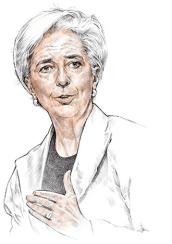European Union finance ministers and central bank governors were wrapping up a two-day informal meeting in France when Christine Lagarde, the French minister and host, offered a toast. It was Saturday, September 13, 2008, and although the economic outlook had deteriorated, the atmosphere was anything but gloomy. The officials discussed proposals for tighter banking supervision and agreed to adopt common reporting standards for EU financial institutions — in 2012. They also reviewed Slovakia’s progress toward joining the euro in three and a half months’ time.
“We ended up with a nice cocktail in Nice, and everybody went home,” the 57-year-old Lagarde recalls. “The following day the financial world collapsed.”
The failure of Lehman Brothers Holdings thrust Europe, and Lagarde, to center stage of the global financial crisis. The investment bank’s collapse sparked a worldwide financial panic and exposed Europe’s weaknesses — an undercapitalized banking sector and a monetary union without sufficient political backing — to the harsh judgments of globalized markets. Europe is still struggling to respond to the challenge. Lagarde, by contrast, has performed with aplomb, first as Finance minister, then, starting in 2011, as head of the International Monetary Fund.

“The fact that the crisis involved and engulfed everybody at the time was decisive in bringing people together,” Lagarde says in an interview at her IMF office in Washington.
That sense of shared purpose has frayed to the breaking point since 2008. Whereas emerging-markets economies were quick to recover, the advanced economies have struggled to restore growth, and the euro area has flirted with disaster. Unconventional monetary policies by the Federal Reserve Board, the European Central Bank, the Bank of England and the Bank of Japan have unleashed volatile capital flows and raised talk of currency wars. The mere mention of the Fed’s tapering its bond purchases has sent emerging-markets currencies and asset prices tumbling. It may not feel like 2008 all over again, but risk is on the rise.
Lagarde has been vocal in warning of the dangers. She worries that fatigued advanced nations will ease up on critical issues: tackling the problem of too-big-to-fail banks, pursuing pro-growth structural reforms in Europe and Japan, achieving medium-term fiscal solvency in the U.S. And she fears that leaders are ignoring tougher long-term challenges, such as restoring the link between growth and job creation and addressing the risks of climate change. “There is less collective drive to sort out and resolve the difficult issues,” she says.
On financial reform Lagarde urges regulators and governments to be “vigilant and resistant” to the power of bank lobbying and stick with plans for higher capital requirements but implement them at a measured pace that doesn’t stifle bank lending. She acknowledges gaps on key issues, such as the leverage ratio — the U.S. is requiring big banks to hold capital equal to 5 percent of total assets, and Europe is mandating 3 percent — but believes those differences will narrow.
“At the end of the day, the markets will decide,” she says. “My hunch is that the higher standards will eventually prevail.”
On Europe, Lagarde faces no small amount of skepticism over the IMF’s role in euro area bailouts. In July, Brazil’s executive director abstained from voting on the latest installment of aid to Greece, contending that the Fund was throwing good money after bad. Lagarde maintains that the institution has to play a big role in Europe. “It is the mandate and the mission of the Fund to be engaged wherever there are financial crises that threaten international financial stability,” she says.
The Fund has acknowledged mistakes. In a paper in April, it admitted that it had underestimated the impact of fiscal austerity on the economy of Greece, where output has fallen by nearly 25 percent since its peak in 2007 and unemployment has soared to 27 percent. “We’re learning constantly because we are in very uncharted territory at the moment,” Lagarde says. “The right mix between fiscal consolidation and structural measures needed to stimulate growth is a difficult one.”
Lagarde dismisses the idea of a Greek exit from the euro, though. The country’s competitiveness is finally improving, and growth will return if Athens steps up the pace of reform. “What’s the alternative?” she asks. “The Greeks want in their clear majority to stay within the euro zone, and they want to be part of the European project.”
For the wider euro area, Lagarde cites banking union as the big piece of unfinished business. Europe needs a single resolution mechanism and a common backstop to support the banking industry, she says, and the ECB needs to conduct a rigorous review of banks’ asset quality before taking over as the bloc’s banking supervisor next year: “Otherwise you’re asking people to marry in the dark. They don’t know what the bride looks like.”
As for the global economy, Lagarde worries that the end of quantitative easing will set off new shocks. Ben Bernanke’s May hint that the Fed would taper bond purchases was “a blessing in disguise” for alerting policymakers to the danger of excessive risk-taking in financial markets, she says, but it has sent currencies into free fall from Brazil to Indonesia. Storms may be coming. If they do, Lagarde and the Fund, with its $1 trillion in lending resources, will be very much in the middle of the action.
Illustration by Bernd Schifferdecker
The Legacy of Lehman: A Look at the World 5 Years After the Financial Crisis
- 5 Years After Lehman, No One Can Declare the Financial System Safe
- Europe's Banks, Slow to Restructure, Pose a Systemic Risk Today
- Emerging Markets Face Mounting Challenges as Global Liquidity Dries Up
- As the Fed Readies to Taper, Is the World Ready for Higher U.S. Rates?
- China Exploits Crisis, Positions Renminbi as Potential Rival to Dollar






